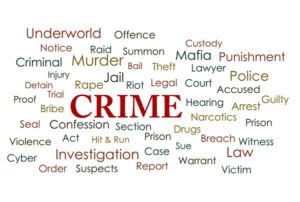True crime is an interesting topic, and the niche is more multifaceted than a diamond. Authors with a knack for research and interviewing could make this genre their best friend. I’ve written about crime scene cleaning and true crimes, interviewed reformed criminals, and learned about law. Here’s how (writing) true crime pays.
Crime Scene Cleaning: A First Feature Sells
My crime writing fascination started by interviewing Crime Scene Solutions (People Magazine), finding out that true crime is about co-operation between police departments, investigators, cleanup crews, and other law enforcement branches.
Crime authors cover crimes, but also effects, impact, cases, and resulting industries. You’ll never tire of the intrigue, and there’s always something new to pitch.
Second, I sold Cold Cases (People Magazine), investigating infamous South African crimes. For this article, I researched intensively, and tracked down Flippie van Rooyen, the son of notorious child-abductor Gert.
Knowing the Law
While writing The 18 Rules of Journalism for Writers Write, I made the 13th rule this: Know the law.
It’s especially true within criminal and justice-related writing, even fiction where your characters must appear to have real procedural background.
I have copies of the Criminal Procedure Act and laws against human trafficking, as well as databases like Justia and Lawcator.org bookmarked for reference.
True crime writers should research relevant laws, case studies, and forensic technologies. Join newsletters and watch press releases, like the US Department of Justice, Forensic Mag, and the South African Police Service’s newsroom.
Using Justice and Law Enforcement Resources
Create a folder with law enforcement resources, newspapers, and archives. I’ve used the South African Police Services newsroom, the FBI news site, the local court system for case lookups, and newspapers like News24. Every country has similar links, like FindLaw CaseLaw for the United States, Interpol’s website for international data, and Legislation.co.uk.
Cover news from an unbiased viewpoint, choose responsible angles, and never interfere with open investigations by publishing anything without resources backing up your words or giving approval.
Successful crime authors know where to reach top law enforcement officials, and their press departments, and become familiar with them for repeat contact.
Knowing Law Enforcement Plus Procedure
Develop a relationship with local law enforcement. Attend open days for the public, note their details, and make an appointment for a tour of the station — see procedures in action, and watch how law enforcement and courts get to work.
Courts will also let authors sit in, and a walk through the courtroom library is a learning experience worth lifetimes of knowledge for authors seeking inspiration.
Law enforcement contacts will also, sometimes, share important information about their industry. For example, I noticed a call for new recruits, and wrote about it for The South African (Careers in the police).
Covering Legal Changes and Laws
Cover legal changes and current laws as a crime writer. Mainstream publications prefer (1) legal explanations for everyday readers (e.g. “Catfished: Potential signs of a romance scammer” for The South African, (2) summaries of new laws and their impact (e.g. “SASSA fraud remains a criminal offense” on MSN), or (3) human interest pieces (e.g. “I Survived a Kidnapping” for People Magazine).
Niche law publications prefer (1) in-depth or industry legal coverage, (2) industry information pertinent to careers.
For example, LitNet’s legal section, or the internally-published SAPS Journal for law enforcement officials.
I covered important changes in restraining order law (LitNet, 2023), and wrote about complaints against lawyers (The South African, 2023) with in-depth legal coverage and industry information in mind.
Covering Current Crime
Breaking news, criminal psychology, and syndicates are hard-hitting topics. Write with care, because crime writing often attracts criminal attention — and while illegal, criminals can easily sneak a phone into prison to let you know their thoughts or feelings.
Cover current crime, like the country’s top enforcement officials (MSN), or information about dating app syndicates warning readers about their techniques.
However, make your social media profiles private instead of public. Learn to use the Report and Block buttons on social media websites like Facebook, X.com, and TikTok. Report suspicious activities or threatening messages to the law, and always keep copies.
Pitching Insider’s Perspectives
Publications often buy interviews and insider’s perspectives, because the “whys” behind crime fascinates people. Look for biographies (like “Escape from Pretoria” by Tim Jenkin) and speakers like reformed banking fraudster and speaker Brad Sadler for inspiration.
I covered Brad Sadler, a convicted, reformed banking scammer’s story for A Fraudster Confesses, and always keep my ears to the ground for more stories to tell. A casual conversation is always a contact, a reference, or a story.
I also wrote about Cryptocurrency Fraud (The Citizen) and Money Laundering (MSN), revealing techniques (and how to avoid them) to readers.
True crime writing is rewarding, it informs its readers, it documents important events and stories, and sometimes it can even provide insight or justice through writing.
Bio: Alex J. Coyne is a journalist, author, and proofreader. He has written for a variety of publications and websites, with a radar calibrated for gothic, gonzo, and the weird. Sometimes, he co-writes with others.
Leave a Reply